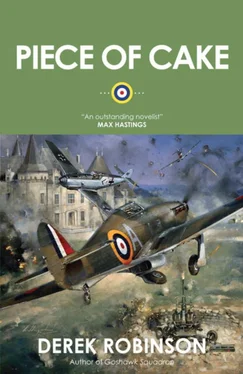“I thought hospitals fed you every other hour,” CH3 said.
“Possibly. I wouldn’t know. I didn’t wake up till last night.”
“You mean you were unconscious all that time?”
“Dunno. Can’t remember. Shove the marmalade over, will you?”
They watched him spoon marmalade onto toast. His face was as pale as skimmed milk and his eyelids were curiously heavy, as if he were shielding his eyes from glare. His fingers gripped the marmalade spoon so tightly that his nails were half-white.
“I’m surprised they sent you back so soon,” CH3 said.
“They didn’t. I did a bunk in the middle of the night.”
“Ah!” Cox exclaimed. “And I bet you couldn’t catch a train, could you?”
“Didn’t try,” Renouf said. “Hitch-hiked.” Already, he was buttering his next piece of toast. “More coffee, please,” he told a waiter.
“Hitch-hiked?” CH3 said. “From Ramsgate? In the middle of the night?”
“Gorgeous blond in an MG picked me up. Very friendly. Drove me all the way here. Nice girl. Couldn’t do enough for me.”
“I’m sure,” Cox said. “Have some more porridge, Nim.”
Cattermole and Macfarlane had joined them. “It can’t be done in an MG,” Macfarlane said. “The gearstick gets in the way.”
“I never found any difficulty,” Cattermole said. “Mind you, she was a Japanese trapeze-artist with a degree in engineering. You look bloody awful.”
Renouf said: “Well, I feel okay.”
“I can’t help that. You look bloody awful. Good morning, sir.” Barton had just sat down. “Don’t you think Nim looks bloody awful?”
“Later,” Barton said. “Somebody give me some coffee.”
“I need some decent grub inside me, that’s all.” Renouf looked at his latest slice of toast, breathed deeply, and tried to pick it up; but his fingers failed to grip, his eyes closed, and he slumped gently against Cox’s shoulder.
They carried him to a sofa, where he slept with his thumb in his mouth until early afternoon.
Later, Barton called everybody into his office.
“It’s pretty certain that Nim went down because of oxygen starvation,” he said. “Either his bottle wasn’t full or his mask went duff or something. He was lucky. In most cases the pilot never comes to again. What d’you remember?”
“Not much,” Renouf said. “It happened very fast. One moment I was fine, a couple of seconds later I began to feel sort of woozy, but the strange thing is I couldn’t seem to take it seriously. I felt quite relaxed and happy.”
“A bit pissed?” the adjutant said. Renouf nodded. “It used to happen to us all the time,” the adjutant told them.
“Nothing mattered,” Renouf said.
“Anything else?” Barton asked. “Did your Mae West work okay?”
“Yes, it held me up. What I really needed, of course, was a dinghy. I tell you, that Channel’s bloody cold, even in August. It was too bloody cold for me. I don’t remember getting fished out. Not a thing.”
“So now you know,” Barton told them. “Try and come down near a boat if you possibly can. There’s a hell of a lot of drink out there. Okay, that’s all. We’re released for the rest of the day.”
It was too late to go up to London. Most of them wandered back to the mess and played cards, waiting for the cinemas to open.
Pip Patterson stood and watched a game of gin rummy. Now that there was definitely no flying he felt hugely relieved, and yet there was nothing he wanted to do with the free time. The rain depressed him. He slowly realized that it would always be like this. It would always be bad weather when he was released, and always good weather when he was trapped at dispersal.
Cattermole won a hand, and pretended to notice Patterson. “Ah, this will interest you, Pip,” he said. “Young Fitz has asked me to be godfather to his imminent child.”
“I don’t believe you.”
“Suit yourself.”
“One of these days,” Patterson said, “I think I’ll take Fitz aside and tell him some of the facts of life.”
Cattermole shuffled and dealt. “Apparently it was Mary’s idea,” he said. “Smart girl, Mary.”
Next day the blitzy weather returned, and with it the raids. Hornet squadron got scrambled five times. Brambledown was bombed again; this time they hit the airfield. Bodkin Hazel was strafed by lowflying Me-110’s. By evening, Skull had reports of similar raids on seven other fighter fields. It was clear that the Luftwaffe could not wait to destroy Fighter Command in the air, and so was planning to knock out its bases in southeast England. The BBC gave the day’s score as Luftwaffe thirty-three, RAF ten, and the sun set in a saffron sky.
The next day was fine and dry. So was the next. And the next. There was no rest. The raids got bigger and more frequent, until the pilots were doing little more than flying and fighting and sleeping. Some enjoyed this enormously. Whenever Zabarnowski and Haducek took off, it was with a feeling of eagerness that approached exultation. They relished the fight, pressed home their attacks more savagely than anyone else, often closed to fifty yards in order to make sure of the kill, then sheered away with the debris of the explosion scarring their planes. They quickly became the top-scoring Hornet pilots. Zab and Haddy loathed Germans. They wanted to shoot down German planes all day, every day, preferably in flames. Zab had learned the word flamer from the adjutant and he used it a lot. “Today, another flamer for me,” he would tell Skull happily. “Heinkel bomber. That’s a crew of five, you know? Sizzle, sizzle, crackle, crackle. I sent them all to hell and I gave them a little taste of it on the way.”
“Just the facts, please.” Skull’s face was expressionless. “Were there no parachutes?”
“Oh, one fellow tried to jump but it didn’t open.”
“That is a lie,” Haducek said. “I saw it open but you went down and shot at him and it closed.”
Barton heard that. “Look here, Zab,” he said. “That’s not on, you know, shooting at Jerry parachutists.”
“Was a mistake,” Zabarnowski said. “I aim at a Messerschmitt but I miss and hit a parachute, very sorry.”
“No, I mean it,” Barton said, and stared until Zabarnowski met his gaze. “When a Jerry bales out over England he’s a prisoner-of-war and we don’t shoot him. He’s out of the war, see? Those are the rules.”
“Rules, rules,” Zabarnowski muttered, and said something brisk and spiky in Polish.
“That’s an order,” CH3 told him. “Jerry parachutists are non-combatants, understand? They can’t fight any more, so we leave them alone.” Zabarnowski sniffed, and scowled at his boots.
“Very interesting,” Haducek said. “Now tell me please, what are the German rules? If I bale out, I can fight again, can’t I? So—”
“That’s the theory, I agree,” Barton said, “but Jerry seems to be playing the game so far, and—”
“Game?” Zabarnowski said. “You call this a game?”
The only other pilot with anything like the same insatiable appetite for combat was Flash Gordon. There was no doubt any more that he was, from time to time, mentally unstable. On the ground his moods varied sharply and unpredictably, from a schoolboy petulance to a bland, middleaged amiability that might suddenly turn to acid contempt or—what several pilots found more disturbing—a prolonged and enthusiastic analysis of bulletwounds. Gordon would delight in plotting the longest and most destructive course that a bullet could take. “Let’s say it chops through your shoulder, cracks your collarbone and hacks its merry way down through your right lung… That would bring it to your liver, which is a very prominent item, I mean it could hardly miss that , and who knows, it might take a slice out of your diaphragm in passing. None of that stuff is very resistant, of course, it’s all soft and mushy, so the bullet still has plenty of power to use up, which means it could make a very thorough mess of your stomach before it took a whack at your plumbing. The only thing I’m not sure of is, would it get a chance to hit your gall bladder on the way?”
Читать дальше












